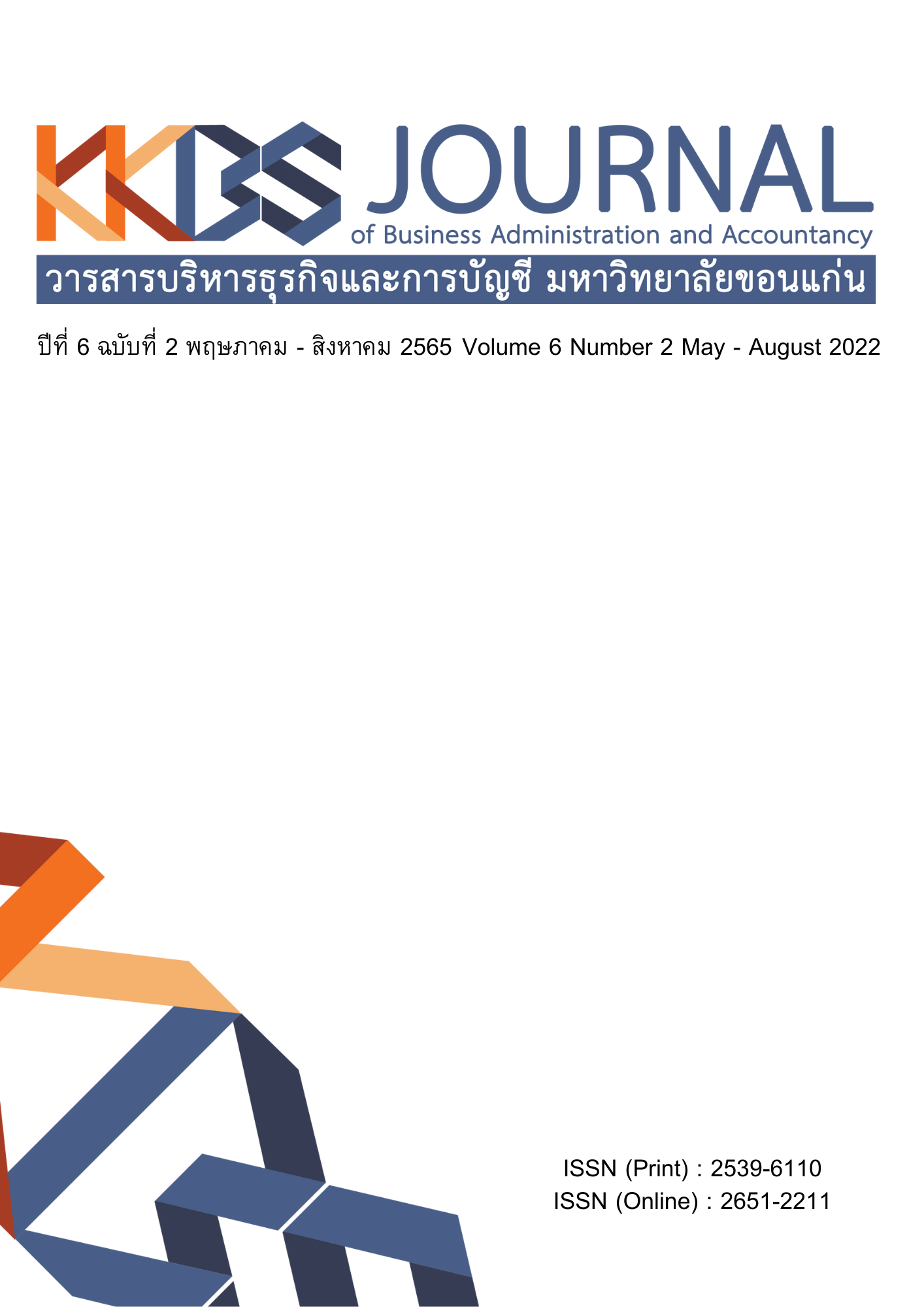Key Success Factors and Design Thinking for Beginning Determination Startup Business of Generation Z Population in Bangkok
Main Article Content
Abstract
The finding that key success factors and design thinking for beginning determination startup business of generation z population in Bangkok have purpose 1) study and survey the opinions of the generation z groups on the success factors of startup 2) study the path of success factors affecting the intentions of starting a generation z startup business in Bangkok 3) study the adaptive influence of design thinking. The quantitative study focuses on generation x living in Bangkok, who are interested in beginning determination startup business for generation z population in Bangkok. Data were analyzed with descriptive statistics to determine the percentage, arithmetic mean, and standard deviation. A multiple regression equation tests was conducted to test the research hypotheses. The research found that most respondents were by age 19-24, income minimum of 25,000 bath have interested of starting a business startup within 6 months by type of business that the most of interesting business startup E-Service have The key success factors of startup business 1) Business plan 2) New idea 3) Teamwork 4) Timing then branding of startup business 1) Specify target group 2) Identity brand 3) Design brand and key success of design thinking 1) Ideate 2) Define target 3) Empathize. The hypothesis test found that Key Success Factors and Design Thinking for beginning determination startup business of generation z population in Bangkok a statistical significance level of p<0.05
Article Details

This work is licensed under a Creative Commons Attribution-NonCommercial-NoDerivatives 4.0 International License.
The articles published in the journals are the authors' opinions, not the opinion of the editorial team or administrative staff. The articles published is copyright of the Journal of Business Administration and Accounting, Khon Kaen University.
References
Ajzen, I. (1991). The theory of planned behavior. Organizational Behavior and Human Decision Processes, 50(2), 179-211.
Bodhisuwan, P. (2020). Event pop “Startups think like SMEs”. Retrieved June 12, 2020, from https://www.brandage.com/article/19751/Eventpop (In Thai)
Bruton, G.D. & Ahlstrom, D. (2003). An institutional view of China's venture capital industry: Explaining the differences between China and the West. Journal of Business Venturing, 18(2), 233-259.
Cheung, M. W. L. (2013). Implementing restricted maximum likelihood estimation in structural equation models. Structural Equation Modeling: A Multidisciplinary Journal, 20(1), 157–167.
Gross, B. (2018). TEDTalks by Bill Gross reason of found startups for success. Retrieved June 12, 2020. From https://techsauce.co/news/tedtalks-bill-gross-startups-success.
Hair, J.F. et al. (2009). Multivariate data analysis. 7th ed. Upper Saddle River, NJ.: Prentice Hall.
Ketprakob, N. et al. (2015). The branding guidelines for small and medium enterprises (SMEs) using provided and enhanced media. The Journal of Faculty of Applied Arts, 6(2), 28-34. (In Thai)
Mutchusri, K. (2017). SET your startup business guide. Retrieved May 19, 2020, from http://www.SET.OR.TH/EDUCATION (In Thai)
Osterwalder, A., Pigneur, Y. & Tucci, C. (2005). Clarifying business models: Origins, present, and future of the concept. Communications of the Association for Information Systems, 16, 1-25.
O’Brien, R. (2001). An overview of the methodological approach of action research. In R. Richardson (Ed.). Theory and practice of action research. Joao Pessoa: Universidade Federal da Paraíba.
Rutkowski, D. (2018). Towards an understanding of educational indicators. Policy Features in Education, 6(4), 470-481.
Sam. (2015). Are you really planning your marketing? Journal of Marketing, 29(1), 1-8.
Sansena, S. (2018). The critical factors to success of startup business. Khon Kaen: Faculty of Science, Khon Kaen University. (In Thai)
Schumpeter, J.A. (1934). The theory of economic development, Cambridge, MA.: Harvard University Press.
Sugsawang, S. (2019). Value creation of innovation. Retrieved June 12, 2020 from http://www.sasimasuk.com. (In Thai)
Vanichabancha, K. (2014). An analysis of SEM with AMOS. 2nd ed. Bangkok: Chulalongkorn University Press.
Wassinger, K. & Baxter, G.D. (2009). Business plans in physiotherapy: a practical guide to writing a business plan for the non specialist. Physical Therapy Reviews, 16(3), 210-227.
Wongpongdee, N. (2017). SET your startup business guide. Retrieved May 19, 2020, from
http://www.SET.OR.TH/EDUCATION (In Thai)
Yamane, T. (1973). Statistics: An introductory analysis. 3rd ed. New York: Harper and Row Pub.
Yutyunuong, T. (2018). Branding of Thailand 4.0. Retrieved June 12, 2020, from https://scholar.utcc.ac.th/handle/6626976254/3881 (In Thai)


